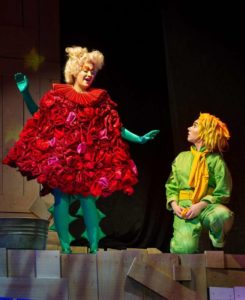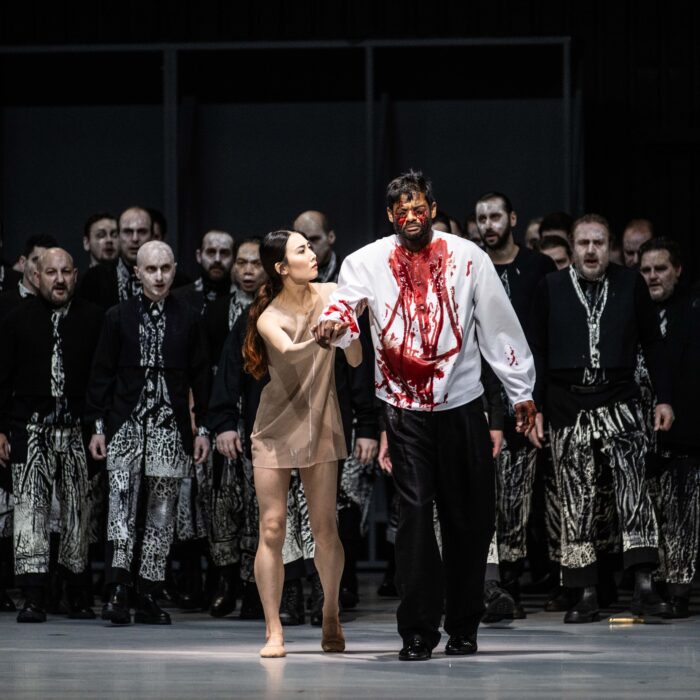
Opera Parallèle 2017-18 Review – The Little Prince: An Exquisite Production That Reminds Us About the Matters of Consequences
By Lois Silverstein“Matters of consequence” – that’s “The Little Prince” all over, and Rachel Portman’s opera version of the remarkable book by Antoine de Saint-Exupéry lacks none of them. From the magical appearance of the titular Little Prince from Asteroid to his magical disappearance at the curtain, Opera Parallèle’s 2017 production in San Francisco brings both the beauty and high-seriousness of the story to life.
With libretto by Nicholas Wright, an eloquent enhancement of an already beautiful text, conducted by Nicole Paiment, Rachel Portman’s harmonious and easily accessible score offers us a touching restatement of values we care about. With energy and precision, Paiment conducts her two versatile musicians, pianist Keisuke Nakagoshi and percussionist Luçik Aprahämian, in a score that originally called for two flutes, one oboe, two clarinets, one bassoon, one trumpet, one trombone, one horn, two percussionists, celesta, harp, and string section. The texture remained fresh and hardly thin for the celestial pageantry it conveyed, the music sustaining the score throughout with vitality. In fact, the lyric simplicity of the text calling for a fable-like milieu and this arrangement amplified that mood particularly well.
So too, the voices, particularly the Little Prince on Opening Night, Erin Enriquez. An elfin-like young girl, she sang with aplomb. Candor was her number one appeal, as well as a small thimble-like voice that immediately touched the heart. She moved with ease, expressed herself with directness and caring. We could hardly wait to hear the many bits of wisdom she chose to say, from one dialogue to the next. Further, she managed to hold a playful note throughout, but without frivolity. Never did she mock either her world-view or the ones she encountered, although in that arena, she certainly could have: Business Man, Vain-Man, Drunkard/Lamplighter, Hunters, Baobabs, King and Courtiers – each deserved a serious poke: Matters of Consequence? Surely not here, in any of the spheres we, on the Earth, count as so.
When it comes to the Rose, the Water, The Fox, of course, the Star, and the Pilot, the response-ability our teacher/prince shines forth. She is never heavy-handed, never judgmental. Instead, curiosity and steadfastness rule the day. That by itself is not simply satisfying but helps us to ask what makes us drop this for the kinds of many matters of consequence, which, according to Portman/Wright/Saint Exupéry don’t matter at all? Hence, the appearance of the Snake, uncurling from a small underground hole in part of the full-length platform, raises our antennae. The sinuous being, in his glittering costume, is hardly scary although he has a serious message to convey. Even here, it is a matter of things as they are: the year is up for the Prince’s sojourn on Earth, and it is the Snake who must lead him back to his own planet; we are more than sad when this occurs. As is, primarily, the human emissary throughout the opera – The Pilot.
In keeping with OP’s intention to cast women in all major roles and thus give the Opera a more Feminist touch, the company cast Mezzo-Soprano, Eve Gigliotti, who possesses a big voice and a strong presence. Her voice was more than resonant and although she sang her role with grace, intensity, and beauty alongside her small pedagogue and ally, its fullness felt at moments too big for the atmosphere. Its sheer amplification cloaked rather than fostered the lyrical texture of its inner web. Never, however, did Gigliotti nor her companion ever forfeit the narrative or cultivated the main celestial atmosphere.
The same goes for Kindra Scharich, as the Fox, a vibrant singer in a physical and appealing performance, complete with gilded leggings, boots, and a glittering skirt. The Rose, Sabrina-Romero Wilson, and The Water, Maggie Finnegan, performed with precise and lovable art. Women flirted and yet projected strength of more than the conventional kind.
The same went for the men. Samuel Faustine (playing the Lamplighter and Drunkard and Hunter), J.Raymond Meyers (the Snake and Vain Man), Zachary Lenox ( Business Man, Hunter, and Babobab), Philip Skinner (King, Hunter and Babobab), all sang with attention and clarity.
The SF Girls’ Chorus sang and danced across the stage/skies dressed as sparkling cranes and stars. They were lustrous for sure, occasionally more than luminous, lighting up the stage in voice and body. One could also call them harmonious, yet they lacked some degree of grace. Director, Brian Staufenbiel aimed them in their intermittent appearances toward the streaming of the production as a whole where multiple colorful projections, including rotating skies and planets, enriched the visual glimpses into worlds within worlds.
Opera Parallèle continues its tradition of innovative, stimulating and renewing musical expressions for all of us in the SF Bay Area. Hats off for a well-wrought effort and a reminder that this is far more than a children’s fable. Its encouragement us to take “The Little Prince” in full measure would be a step in the direction of more life-light, and as such, a way to enhance our own planet with something more than occasional stardust.


